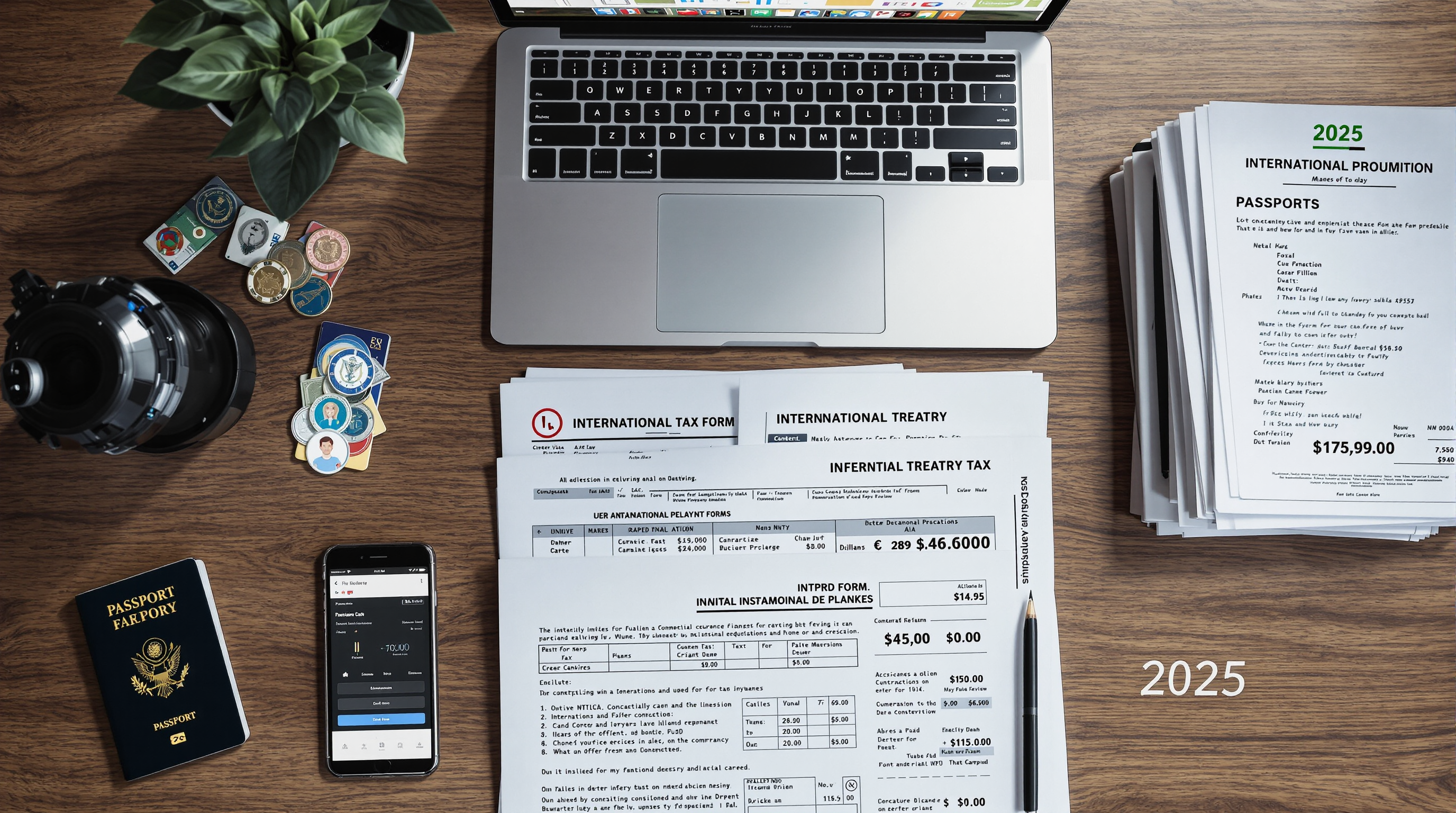The 2025 Digital Nomad Tax Guide: Navigating New International Tax Treaties for Remote Workers and Visa Holders

The 2025 Digital Nomad Tax Guide: Navigating New International Tax Treaties for Remote Workers and Visa Holders
Last updated: May 4, 2025
Quick Summary:
This comprehensive guide breaks down the complex 2025 tax landscape for digital nomads, remote workers, and digital nomad visa holders. Learn how recent international tax treaties affect your tax residency, reporting obligations, and strategies to legally minimize your global tax burden while maintaining compliance with both your home country and host nation regulations.
Table of Contents:
- Introduction to the 2025 Digital Nomad Tax Landscape
- Understanding Tax Residency for Digital Nomads
- New International Tax Treaties and Agreements
- Digital Nomad Visa Tax Implications
- Strategic Tax Planning for Remote Workers
- Global Tax Reporting Requirements
- Common Tax Challenges and Solutions
- Frequently Asked Questions
Introduction to the 2025 Digital Nomad Tax Landscape
The digital nomad lifestyle continues to evolve in 2025, with an estimated 40 million remote workers embracing location independence worldwide. As governments adapt to this growing trend, tax regulations for remote workers have undergone significant changes. The borderless nature of remote work has prompted countries to update tax treaties, introduce digital nomad-specific tax policies, and implement new reporting requirements.
The days of flying under the radar are decidedly over. In 2025, enhanced information sharing agreements between tax authorities have made it increasingly difficult to avoid tax obligations. The good news? Many countries have recognized the economic benefits digital nomads bring and have adapted their tax systems accordingly, creating legitimate opportunities for tax optimization.
This guide examines the latest international tax treaties affecting digital nomads, breaks down the tax implications of popular digital nomad visas, and provides strategies to navigate your global tax obligations while remaining fully compliant. Whether you're considering your first remote work journey or are a seasoned digital nomad adapting to new regulations, understanding these tax developments is essential for financial success in the borderless economy.

This 2025 digital nomad tax map highlights countries with favorable tax treaties and special provisions for remote workers. Green countries offer the most tax advantages, yellow have moderate benefits, and red indicate high-tax jurisdictions for digital nomads.
Understanding Tax Residency for Digital Nomads
Tax residency remains the cornerstone of international taxation in 2025. Most countries determine your tax status through one of three primary tests: physical presence, permanent home, or center of vital interests. For digital nomads, the physical presence test is particularly relevant, as it typically triggers tax residency after spending a specific number of days in a country.
Physical Presence Tests in 2025
The most common threshold remains the "183-day rule" used by many countries to determine tax residency. However, in 2025, several key jurisdictions have modified their approaches:
- Modified Counting Methods: Countries like Portugal and Spain now use "weighted day counting" systems, where partial days and specific entry/exit patterns are calculated differently.
- Look-back Provisions: The UK, Australia, and Canada have strengthened their look-back provisions, examining your presence over multiple years rather than just the current tax year.
- Digital Tracking: Enhanced border systems in the EU, UAE, and Thailand now automatically track entry/exit for tax purposes, making manual day counting obsolete.
The "Substance Over Form" Principle
In 2025, tax authorities increasingly apply the "substance over form" doctrine when evaluating digital nomad tax residency. This means that how you structure your lifestyle matters as much as where you physically spend your time. Factors now routinely considered include:
- Banking activity: Where and how you conduct financial transactions
- Digital footprint: IP addresses, login locations, and online presence
- Community ties: Memberships, recurring activities, and social connections
- Professional relationships: Where your clients, colleagues, and business partners are located
The 2025 Global Tax Forum has established that maintaining strong evidence of your tax residency status is now considered a responsibility rather than a precaution. Digital nomads should maintain proper financial documentation and track their movements methodically to substantiate their tax position.
New International Tax Treaties and Agreements
The international tax landscape has transformed significantly in 2025, with several groundbreaking treaties and frameworks directly addressing remote work. These changes represent both opportunities and potential pitfalls for digital nomads.
The 2024 OECD Digital Worker Framework
Ratified by 63 countries as of early 2025, the OECD Digital Worker Framework establishes harmonized definitions and treatment of remote workers across participating nations. Key provisions include:
- Remote Worker Classification: Creates three distinct categories: "digital nomads," "remote employees," and "international freelancers," each with specific tax treatment
- Income Source Rules: Clarifies that income is generally sourced where the work is performed physically, not where the client or employer is located
- Streamlined Reporting: Introduces a standardized "Global Worker Tax Declaration" accepted by all participating nations

This comprehensive chart maps the 2025 tax treaty network covering digital nomads, highlighting special provisions for remote work taxation, double taxation avoidance, and reciprocal benefits between participating countries.
Bilateral Digital Nomad Tax Agreements
Beyond the OECD framework, several bilateral agreements have emerged in 2025 that specifically address digital nomad taxation:
- EU-Southeast Asia Digital Corridor: Provides tax certainty for European citizens working from Thailand, Indonesia, Vietnam, and Malaysia with simplified reporting requirements
- US-LATAM Remote Worker Convention: Establishes clear tax rules for US citizens working from Mexico, Costa Rica, Colombia, and other Latin American nations
- UAE-Global Hub Agreements: Dubai has established specific tax treaties with 17 countries to cement its position as a digital nomad hub
The Global Minimum Tax and Digital Nomads
The fully implemented Global Minimum Tax (GMT) of 15% now affects high-earning digital nomads in several ways:
- Personal Liability: Individual earners reporting over €750,000 annually now face GMT provisions previously aimed only at corporations
- Substance Requirements: To benefit from lower tax jurisdictions, digital nomads must demonstrate genuine economic substance in their chosen tax home
- Top-up Tax Mechanism: Home countries can now impose "top-up taxes" if a digital nomad's effective tax rate falls below 15% in their country of residence
These treaties represent a global shift toward recognizing remote work while ensuring appropriate taxation. For digital nomads, they provide increased certainty but require careful navigation. Consider using our travel insurance service which includes tax liability protection to safeguard against unexpected tax claims.
Digital Nomad Visa Tax Implications
With over 45 countries now offering specialized digital nomad visas in 2025, understanding the tax implications of these programs is essential. While these visas provide legal residency, their tax consequences vary dramatically across jurisdictions.
Key Tax Features of Popular Digital Nomad Visas
- Tax Exemption Programs: Several countries, including Croatia, Greece, and Spain, now offer partial tax exemptions on foreign-sourced income for digital nomad visa holders.
- Territorial Taxation: Countries like Panama, Costa Rica, and Georgia apply territorial tax systems where only locally-sourced income is taxed.
- Special Tax Rates: Portugal's updated Non-Habitual Resident program offers digital nomads a flat 20% tax rate, while Estonia's nomad visa participants pay no tax until they reach 183 days of residency.
- Tax Residency Clarification: The UAE Digital Nomad Visa now explicitly states that holders become tax residents, providing invaluable documentation for tax treaty benefits.

This detailed comparison shows the tax implications of digital nomad visas across 10 popular destinations in 2025, including tax rates, foreign income exemptions, social security requirements, and special deductions available to visa holders.
Digital Nomad Visa Tax Pitfalls to Avoid
While these visas offer advantages, several tax pitfalls have emerged in 2025:
- Home Country Tax Obligations: Many digital nomads mistakenly believe obtaining a foreign nomad visa automatically terminates home country tax obligations. This is rarely true, especially for US citizens and residents of countries with citizenship-based taxation.
- Social Security Requirements: Several European digital nomad visas now require participation in local social security systems, creating unexpected costs.
- Exit Tax Triggers: For long-term residents of countries like the US, Germany, and Canada, obtaining a digital nomad visa elsewhere may trigger exit tax provisions if improperly handled.
- Substance Tests: Tax benefits attached to digital nomad visas increasingly require demonstrating substantial presence and integration.
Before applying for a digital nomad visa, consider both its immigration and tax implications. According to tax experts at OECD Tax Policy Center, the most tax-efficient approach often involves combining a digital nomad visa with proper tax treaty planning.
When preparing visa applications, our flight reservation service and hotel booking documentation can help you meet application requirements while you evaluate the tax implications.
Strategic Tax Planning for Remote Workers
Effective tax planning for digital nomads in 2025 requires balancing compliance with optimization. The goal is to legally minimize your global tax burden while fulfilling all reporting obligations.
The Foreign Earned Income Exclusion in 2025
For US citizens, the Foreign Earned Income Exclusion (FEIE) remains a valuable tool, allowing the exclusion of up to $128,700 (2025 amount) of foreign earned income from US taxation. However, recent changes have affected how digital nomads can qualify:
- Physical Presence Test Modifications: The IRS now applies stricter scrutiny to the 330-day foreign presence requirement, with digital documentation often requested as proof.
- Bona Fide Residence Test Updates: Establishing bona fide residence now requires demonstrating community integration, not just physical presence.
- Digital Tracking: The IRS has enhanced access to travel records through international agreements, making accurate reporting critical.
Corporate Structures and Their 2025 Tax Implications
Many digital nomads consider establishing corporate structures to optimize taxation. In 2025, these options include:
- Foreign Corporation: Establishing a company in a low-tax jurisdiction can defer taxation on retained earnings, but 2025's expanded CFC (Controlled Foreign Corporation) rules have limited this strategy's effectiveness.
- Digital Nomad-Friendly LLC: Wyoming and Delaware LLCs remain popular for their flexibility, though the international tax treatment has become more complex with new reporting requirements.
- Estonian E-Residency Company: Estonia's digital company structure has expanded its treaty network in 2025, offering new advantages for digital entrepreneurs.

This strategic decision tree helps digital nomads identify the most tax-efficient approach based on their citizenship, income level, travel patterns, and business structure in the 2025 tax landscape.
Treaty Benefits and Tax Residency Planning
Strategic selection of tax residency can significantly impact your overall tax burden:
- Tax Treaty Networks: Countries like Singapore, Portugal, and the UAE offer extensive tax treaty networks that can reduce withholding taxes and prevent double taxation.
- Non-Dom Regimes: Italy's new digital nomad tax regime joins Portugal and Greece in offering preferential tax treatment for new residents.
- Territorial Tax Systems: Panama, Costa Rica, and Malaysia only tax locally-sourced income, making them attractive bases for those earning primarily from foreign clients.
When implementing any tax strategy, professional guidance is essential. A 2025 survey by the Tax Foundation found that 67% of digital nomads who worked with specialized tax professionals achieved significant tax savings while maintaining full compliance.
Global Tax Reporting Requirements
The reporting landscape for international workers has grown increasingly complex in 2025, with enhanced information sharing between tax authorities making compliance more important than ever.
Common Reporting Standard (CRS) and FATCA in 2025
The automatic exchange of financial information continues to expand:
- Enhanced CRS Implementation: Now with 117 participating jurisdictions, the CRS enables comprehensive sharing of bank account information, investment holdings, and even crypto asset reporting.
- FATCA Expansion: The US Foreign Account Tax Compliance Act has expanded its requirements, with Foreign Financial Institutions now reporting additional details about American account holders.
- Digital Asset Reporting: New in 2025, major crypto exchanges must report holdings and transactions to relevant tax authorities.
Key Forms and Declarations for Digital Nomads
Digital nomads must be aware of these critical reporting requirements:
- For US Citizens: Form 8938 (Foreign Assets), FBAR (Foreign Bank Accounts), Form 5471 (Foreign Corporations), and Form 3520 (Foreign Trusts) remain essential. New in 2025 is Form 9123 for reporting digital nomad visa status.
- For EU Citizens: The new EU DAC8 directive requires reporting digital assets across borders. Most European countries have implemented standardized "Foreign Presence Declaration" forms.
- Global Worker Declaration: OECD treaty countries now accept this standardized form, simplifying compliance across multiple jurisdictions.
Failure to comply with reporting requirements can result in substantial penalties, even when no tax is owed. The IRS has increased FBAR non-compliance penalties to up to $14,000 per account in 2025, while the EU's harmonized penalty system now imposes fines of up to €25,000 for failure to disclose reportable arrangements.
Common Tax Challenges and Solutions
Digital nomads face unique tax challenges that require specific solutions. Here are the most common issues encountered in 2025 and strategies to address them:
Double Taxation Risks and Prevention
Being taxed twice on the same income remains a significant risk for digital nomads:
- Tax Treaty Relief: Properly invoking tax treaty provisions can eliminate double taxation. The digital nomad must typically file claims in both countries.
- Foreign Tax Credits: Most home countries offer credits for taxes paid abroad, though calculating these correctly requires careful documentation.
- Timing Strategies: Aligning tax years and payment timing can prevent overlapping tax obligations.
Banking and Payment Processing Challenges
Financial infrastructure remains complicated for international workers:
- FATCA-Related Account Closures: Some foreign banks still restrict accounts for US citizens due to FATCA compliance costs. Digital nomad-friendly institutions like Wise, Revolut, and N26 have expanded their offerings in 2025.
- Payment Documentation: International payment processors increasingly report transaction data to tax authorities. Maintaining clear records of the nature of payments is essential.
- Currency Fluctuation: Exchange rate changes can create unexpected tax consequences if not properly tracked and reported.
If you're experiencing banking challenges while traveling, our bank statement services can help you provide necessary documentation for opening accounts or substantiating your financial status.
Remote Work Legal Structures
Choosing the right business structure impacts both taxation and legal compliance:
- Solo Freelancer vs. Corporate Structure: The tax advantages of incorporation have narrowed in 2025, but liability protection benefits remain significant.
- Employer of Record (EOR) Solutions: For those employed by companies in their home country, EOR solutions have expanded globally, offering compliant local employment while traveling.
- Permanent Establishment Risk: Working from foreign countries can inadvertently create a taxable presence for your employer or your own business, requiring careful management.
Frequently Asked Questions
Q: As a digital nomad, can I be completely tax-free in 2025?
Complete tax freedom is rare and risky in 2025. While some jurisdictions don't tax foreign income, your citizenship or prior residency often creates tax obligations regardless of your location. The focus should be on legal tax optimization rather than elimination. Information sharing between countries has made "falling through the cracks" nearly impossible.
Q: How do digital nomad visas affect my tax residency in 2025?
Digital nomad visas typically make you a tax resident of the issuing country, though often with special provisions limiting taxation of foreign income. However, these visas don't automatically terminate your tax obligations to your home country. US citizens, for example, maintain US tax filing requirements regardless of visa status abroad.
Q: Do I need to pay social security contributions in multiple countries?
This depends on tax treaties and totalization agreements between your home country and countries where you work. In 2025, more digital nomad visas include mandatory social security participation. The EU-wide digital worker framework allows nomads to choose a primary social security system and opt out of others, simplifying compliance significantly.
Conclusion: Creating Your Digital Nomad Tax Strategy for 2025
Navigating the complex international tax landscape as a digital nomad requires informed planning and proactive compliance. The 2025 tax environment offers both challenges and opportunities through expanded digital nomad visa programs, new tax treaties, and evolving reporting requirements.
The key to success lies in taking a strategic approach to your global tax situation. This includes understanding your tax residency status, leveraging applicable tax treaties, maintaining meticulous documentation, and seeking professional guidance when necessary. With proper planning, digital nomads can achieve significant tax efficiency while remaining fully compliant with all relevant tax authorities.
Remember that tax planning should be integrated with your broader travel and visa strategy. As you plan your digital nomad journey, ensure your documentation, from flight reservations to financial statements, supports both your visa applications and tax position.
Ready to Simplify Your Digital Nomad Journey?
Our professional document generation tools can help you create all the supporting documents you need for both visa applications and tax documentation:
- Flight Reservations - Verifiable flight itineraries accepted by all embassies
- Hotel Bookings - Confirmed accommodation proof without payment
- Bank Statements - Professional financial documents showing sufficient funds
- Travel Insurance - Coverage certificates meeting visa requirements
Last updated: May 4, 2025 | This guide reflects the most current information available and is regularly updated to ensure accuracy.
Need Help With Your Visa Documents?
Our document generation tools can help you create professional visa application documents quickly and accurately.